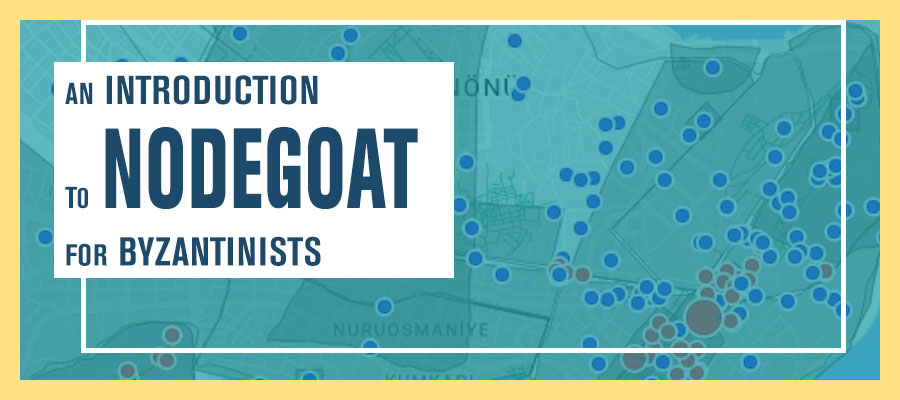An Introduction to Nodegoat for Byzantinsts
How many of us organize key portions of our research and notes in spreadsheets? Whether comparing manuscripts, organizing lists of persons and places, cataloguing objects, or creating tallies of any kind, digital spreadsheets have become a ubiquitous scholarly tool. For many of us, our spreadsheets have started to become unwieldy (how many columns is too many?), or they would benefit from being able to “talk” to open-source reference information like the historical locations in Pleiades. If this is you, then you would benefit from learning about how to build your own relational database: come and learn.
Nodegoat is an open-source software, built to allow scholars with no training in computer programming, doing historical social science and humanities research, to turn their research notes into a custom database. Nodegoat’s free platform allows you to turn an organized spreadsheet into data entry platforms for whatever kind of notes you want to create, to explore new possibilities for analysis, visualization, and links with other projects, and to allow you to set up custom visualization tools to analyze and present what you have. This introductory workshop will introduce you to the concepts behind Nodegoat, guide you in setting up an initial research environment, and leave you with the information to develop that environment.
Zero technical ability or expertise required beyond comfort with filling out an excel spreadsheet; the ability to perform searches on a web browser; and a willingness to think in the abstract and across the disciplines. This workshop will consist of two halves. The first is a non-technical introduction that will survey some potential uses of Nodegoat’s relational database software across multiple scholarly disciplines, explain the key concepts behind a relational database, and then introduce the basics of Nodegoat from a user’s perspective. The second half will walk participants through importing a pre-prepared spreadsheet of historical items into Nodegoat, and then manually adding data on persons and places to model turning such data into a relational database. The workshop will conclude with a short demonstration of the network and geospatial visualizations already possible and how to re-export the data just created. Participants will be directed to to resources for reviewing the concepts in the workshop and for further self-instruction.
What is a Nodegoat? Node: a point at which lines or pathways intersect or branch; Goat: intelligent, curious creature; Nodegoat: intelligent intersections of curious points? In slightly more technical terms, Nodegoat is a tool for turning complex historical data (time-, space-, and source-specific) of all kinds into linked data that can be immediately visualized, made publicly available, and exported in standard file formats (such as GeoJSON and CSV). It “allows scholars to build datasets based on their own data model and offers relational modes of analysis with spatial and chronological forms” so that “scholars are able to instantly process, analyse and visualise complex datasets relationally, diachronically and spatially."
Registration is closed.
Additional Opportunities
For those who are interested in setting up their own Nodegoat database, a follow-up workshop will provide guidance and the opportunity to learn additional customizations. Information about the follow-up workshop will be shared with participants after the initial workshop.
Workshop Checklist & Preparation
- Computer with stable internet connection.
- Nodegoat account.
- Download pre-prepared data.
Who is eligible?
- Graduate students and early career researchers (PhD received October May 2015) in the field of Byzantine studies.
- All participants must be BSANA members. BSANA membership is free for graduate students and early-career contingent scholars who have earned their PhD within the last eight years and who do not hold a permanent or tenure-track appointment. If you are not already a BSANA member, please complete the BSANA Membership Form before registering for the workshop. Your membership status will be confirmed before your space in the workshop is confirmed.
This workshop is part of the partnership between the Mary Jaharis Center for Byzantine Art and Culture and the Byzantine Studies Association of North America to provide digital humanities training opportunities to graduate students and early career researchers.
